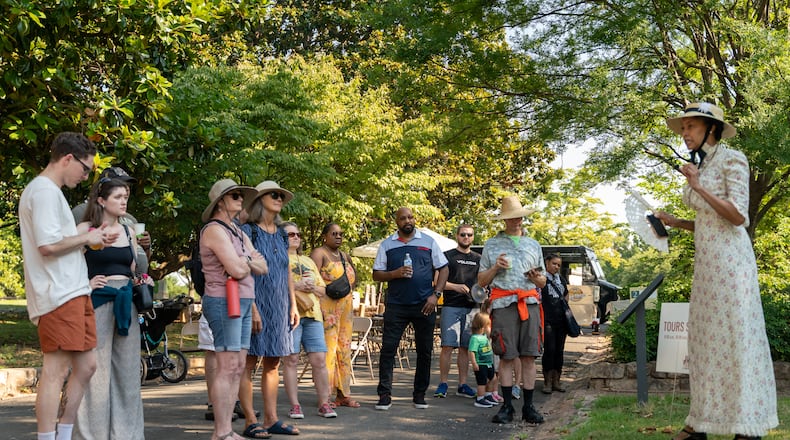Opened in 1928, William A. Harris Memorial Hospital — located in Washington Park on what is known today as Martin Luther King Jr. Drive — was the first private hospital in the city that served Black Atlantans.
The 80-bed facility was opened by husband-and-wife duo Charles W. Powell and Sayde Harris Powell, a surgeon and nurse who used their skills and determination to bring health care access to ailing African Americans who weren’t welcome at other institutions.
Although both health care leaders died decades ago, visitors to Oakland Cemetery on Saturday had a chance to meet them on a special Juneteenth tour of the park that featured pioneers who championed equity for Black residents during the Reconstruction Era.
Actors placed around the cemetery told the Powells’ story along with other historic icons like Walter Henry “Chief” Aiken — head football coach at both Atlanta University and Clark College — and Dr. Thomas Slater — one of the first African Americans to obtain a pharmacy license in Georgia.
“The theme of the tour and the theme of Juneteenth is ‘determined to rise,’” said Jihan Hurse, the volunteer tour guide who led visitors around the grounds during the festival. “There are stories here today we want to highlight that show the determination of African Americans in Atlanta.”
“Atlanta has its own theme of the phoenix rising — African Americans did the same thing,” she said.
Credit: Ben Hendren
Credit: Ben Hendren
Some 12,000 African Americans are buried on 3.5 acres of the 48-acre cemetery that sits on the outskirts of downtown, just minutes away from the Georgia State Capitol. When the cemetery was first founded in 1850, Hurse said, there were only around 18 free people of color in the entire city.
Through events like the annual Juneteenth festival, cemetery staff aim to both increase awareness of the accomplishments of its Black pioneers laid to rest in the cemetery, but also outreach to Atlantans who may not know everything the space has to offer.
“Most people don’t know we have African American grounds here,” said Charvis Buckholts, the director of education and youth programs at Oakland. “People that played a major part in shaping not only Atlanta history, but also U.S. history.”
Despite the blistering heat — with temperatures hitting the mid-90s — hundreds of Atlantans visited Oakland Cemetery to learn more about its history, celebrate with live music and shop from local vendors.
Credit: Ben Hendren
Credit: Ben Hendren
Under the shade of White Oak trees, attendees joined a special libation ceremony to honor one’s ancestors led by The Big Bethel AME Heaven Bound Choir. Later, the voice of singer and songwriter Veronika Jackson, an acoustic folk blues musician, rang out through the winding cobblestone trails lined with ornate headstones.
LaDoris Bias Davis, a Gullah Geechee storyteller of more than three decades, captivated young audiences with African folktales like that of Lee Lee Goro, which tells how leopards got their spots, elephants their tusks and even how spiders came to have eight legs.
In 2022, Oakland Cemetery celebrated the final phase of its massive project to restore the African American Burial Grounds within the northeast portion of the park. The initiative began after the Historic Oakland Foundation discovered the area contained more than 800 unmarked graves using ground-penetrating radar.
Credit: Ben Hendren
Credit: Ben Hendren
Director of Horticulture for the cemetery Abra Lee said that garden teams for the park are working toward honoring its Black residents in another way — through its flowers.
“What we are focusing on now is taking inventory so that we can start installing plants that were significant or important to Black communities — found in Black yards during that time,” Lee said.
Things like sunflowers and zinnias, she said, that held special meaning for Black families — particularly Black women.
“We want to add that bold, vibrant color — reds and yellows — that really speak to Black communities, living out loud and living a colorful life,” she said.
Credit: Ben Hendren
Credit: Ben Hendren
About the Author
Keep Reading
The Latest
Featured







